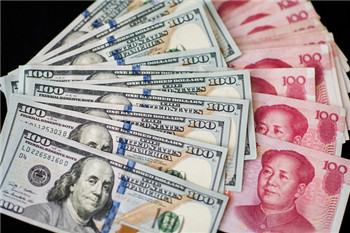(单词翻译:单击)

If the prospect of the Chinese renminbi’s entry into the basket of currencies composing the special drawing right was supposed to insulate it from the whims of speculation, no one appears to have told the foreign exchange traders.
如果说中国的人民币加入特别提款权(SDR)货币篮子应该使人民币免受投机的影响,似乎没有谁告诉外汇交易员这一点。
Yesterday, after data showed Chinese exports in November sharply lower over the year on the back of weak external demand, the renminbi dropped to its lowest level in four years. Earlier this week, it emerged that Chinese official foreign exchange reserves registered their third-largest monthly decline on record in November.
昨日公布的数据显示,由于外需疲弱,11月中国出口较上一年同期大幅下降,导致人民币汇率降至4年低点。本周早些时候,有消息称,11月中国官方外汇储备录得历史上第三大月度降幅。
Beijing is discovering that symbolic achievements such as admission to the SDR basket are less important than having a sustainable growth model. China is trying to effect a hugely difficult balancing act between short-term growth and long-term stability. In the face of capital outflows and downward pressure on the currency, it must steer an uneasy course between the two.
北京方面发现,人民币加入SDR货币篮子等象征性成果,不如拥有一个可持续增长模式重要。中国正想方设法在短期增长和长期稳定之间达成非常艰难的平衡。面对资本流出和人民币贬值压力,中国必须在两者之间找到一条艰难的路。
Having long ago announced its intention to shift from an economy led by investment and exports to one driven by domestic and particularly consumer demand, China has been overtaken by events. A slowdown in global export demand, and a general sell-off of emerging market currencies, have assisted the first goal, on a cyclical rather than a structural basis. But they have done little to help the second leg of growth in consumer demand and domestic services.
中国很早以前就宣布推动经济转型,把增长动力由投资和出口转向国内、尤其是消费需求,但如今受到了各种事件的冲击。全球出口需求的放缓,加上新兴市场货币普遍遭到抛售,从周期上而不是结构上帮助中国减少对出口的依赖,但是对于消费需求和国内服务基本没有帮助。
In August, in response to pressure on the currency, China allowed the renminbi to fall and announced that henceforth it would follow a more market-determined pattern. To the extent that it was a true move towards a freely floating currency, this was a decision in the right direction. However, it would have been much better taken in calmer times, looking like principle rather than expediency. Since then, the renminbi has continued to operate in an atmosphere of uncertainty over how far the natural pressures of buying and selling will be allowed to operate.
8月,为了应对汇率压力,中国允许人民币贬值,并宣布,从此将允许汇率更多地由市场因素来决定。就采取真正措施实现汇率自由浮动而言,这个决定的方向是正确的。然而,如果该决定是在更平静的时期作出会好得多,那样的话看起来就是在依原则行事,而不是在采取权宜之计。自那时以来,人民币行情一直笼罩在不确定氛围中,人们不知道中国会在多大程度上让买卖的自然压力决定人民币汇率。
There is some good news. First, whatever excitable currency warriors might think, China is clearly not embarking on a deliberate competitive devaluation to boost manufacturing exports. A fall in the currency accompanied by a rapid decline in foreign exchange reserves is evidence of policymakers trying to manage a devaluation rather than engineering one.
有一些好消息。第一,无论易激动的货币斗士可能有何种想法,中国政府明显并没有为了刺激制造业出口而故意推动竞争性贬值。人民币贬值的同时,中国外汇储备快速减少,证明政策制定者正在努力应对贬值,而不是策动贬值。
There is also tentative evidence that domestic demand may be responding to the multiple cuts in interest rates and reductions in banks’ reserve requirement ratios that the People’s Bank of China has implemented. Although imports dropped by 8.7 per cent in dollar terms last month on a year earlier, the fall was smaller than expected, suggesting stronger demand sucking in goods from abroad.
也有初步证据表明,国内需求或许正对中国央行(PBoC)的多次下调利率和存款准备金率做出回应。尽管上个月以美元计的进口同比下降了8.7%,但下降幅度小于预期,表明有更强的需求在吸收外国商品。
Beijing had better hope that such signs of life continue. China is in an unenviable position, albeit one largely of its own making. Having unbalanced its own economy for decades while external conditions — buoyant demand and rapid capital inflows — were supportive, it is attempting to reverse that in a much more unfavourable environment. Its next immediate challenge is to manage the aftermath of the US Federal Reserve’s decision on interest rates next week, especially if, as markets expect, borrowing costs are raised.
北京方面最好祈祷这样的“生命迹象”持续下去。目前,中国正处在一个不妙的境地,不过,这主要是它自己造成的。在外部条件有利时(需求旺盛、资本流入快),中国曾允许经济失衡数十年,如今正努力在不利得多的环境里逆转失衡。中国的下一个即将来临的挑战,是应对美联储(Fed)下周有关利率决定的后果,尤其是,如果借债成本如市场预期的那样升高的话。
This week’s news was not terrible for China: it shows an economy in awkward transition with policymakers trying to cushion the blow. Yet with its room for manoeuvre reduced by weak global demand and skittish investors, Beijing will need luck as well as judgment to continue the process.
本周的消息对中国来说并不可怕:它表明中国经济正在艰难转型,而政策制定者正努力减缓冲击。不过,由于全球需求疲弱和易受惊吓的投资者压缩了中国的调控空间,中国将需要判断力和运气才能继续转型之路。


